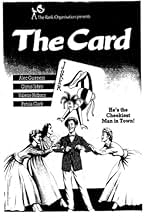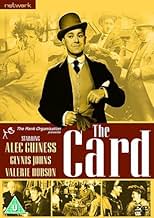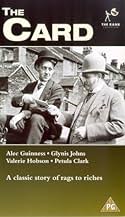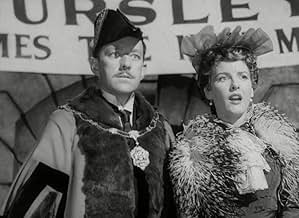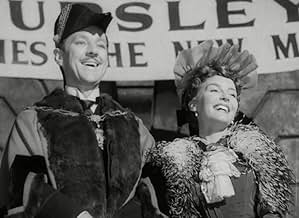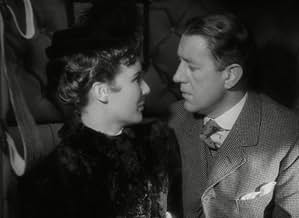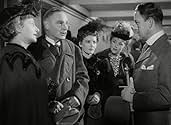IMDb RATING
7.0/10
2.1K
YOUR RATING
Edward Machin, an Edwardian-era young rogue of lowly origin, decides he must do what he can to raise his living standards in order to see the world and shape his own destiny.Edward Machin, an Edwardian-era young rogue of lowly origin, decides he must do what he can to raise his living standards in order to see the world and shape his own destiny.Edward Machin, an Edwardian-era young rogue of lowly origin, decides he must do what he can to raise his living standards in order to see the world and shape his own destiny.
- Nominated for 1 Oscar
- 1 nomination total
John Adams
- Customs Official
- (uncredited)
Peter Copley
- P. Shillitoe
- (uncredited)
Mark Daly
- Lord Mayor
- (uncredited)
Arthur Dibbs
- Doorman
- (uncredited)
Deidre Doyle
- Widow Hullins
- (uncredited)
Henry Edwards
- Mr. Cotterill
- (uncredited)
- Director
- Writers
- All cast & crew
- Production, box office & more at IMDbPro
Featured reviews
It's easy to like this charming, unpretentious film in which Alec Guinness's restrained performance hits all the right notes. His fine work during the early 50's is unfortunately overshadowed by the public's identification with him in such big budget productions as The Bridge Over the River Kwai and Lawrence of Arabia. It's the "small movies" like this one (The Lady Killers, The Last Holiday, The Captain's Paradise and Man in the White Suit also come to mind) where we see his real skill and genius. The Card is enhanced by the appealing characters played by Glynis Johns and Valerie Hobson. Fans will also recall Hobson in another Guinness film, Kind Hearts and Coronets. One bit of puzzling trivia: How did Eric Ambler, known mostly for his espionage novels and, later, for Topkapi, come to write the screenplay for this gentle comedy?....
A classic Alec Guinness, as the young man from the lower class who wants to move up in the world, and does, because he has the courage to go for it. In one scene his boss tells him off (not an exact quote), "So, you fancy yourself being with your betters, do you?" The cheeky reply is "Yes, don't you?"
The best line is when his assistant brings him a pile of money collected from his latest enterprise, and comments that it seems a lot of money for doing nothing. The response is: "But I did do something; I thought of it."
This is a funny, thoughtful, social commentary, with a great look at both the lower and upper classes.
The best line is when his assistant brings him a pile of money collected from his latest enterprise, and comments that it seems a lot of money for doing nothing. The response is: "But I did do something; I thought of it."
This is a funny, thoughtful, social commentary, with a great look at both the lower and upper classes.
10gray4
One of the greatest British comedies of the 1950s and one of Alec Guinness' most satisfying roles early in his long career. As Denry Machin, son of a washerwoman and the "card" of the title, Guiness brings to life one of the almost forgotten stories about the "five towns" (Stoke-on-Trent) of Arnold Bennett. The old-fashioned and very English word "card" had to be translated into the American title "the promoter", but that is a far less accurate description of Denry Machin's combination of charm and opportunism.
He is supported by four magical actresses, in sharply contrasted roles. Gold-digger Glynis Johns, her friend Petula Clark, aristocrat Valerie Hobson and mother Valerie Turleigh are all charmed in their different ways by Guiness' smiles as he "gives providence a helping hand". William Alwyn's music is perfect, with a jaunty theme-tune that has lingered in my memory for more years than I care to remember. Ronald Neame's direction, also at the start of an impressive directorial career, brings the best out of Guinness, although the setting is disappointingly 'comedy-Northern' rather than specifically Stoke-on-Trent.
Overall a delightful film, and the perfect pick-me-up after watching a depressing Hollywood block-buster (Million Dollar Baby). And watch out for one of the movies' great sign-off lines, from Valerie Hobson.
He is supported by four magical actresses, in sharply contrasted roles. Gold-digger Glynis Johns, her friend Petula Clark, aristocrat Valerie Hobson and mother Valerie Turleigh are all charmed in their different ways by Guiness' smiles as he "gives providence a helping hand". William Alwyn's music is perfect, with a jaunty theme-tune that has lingered in my memory for more years than I care to remember. Ronald Neame's direction, also at the start of an impressive directorial career, brings the best out of Guinness, although the setting is disappointingly 'comedy-Northern' rather than specifically Stoke-on-Trent.
Overall a delightful film, and the perfect pick-me-up after watching a depressing Hollywood block-buster (Million Dollar Baby). And watch out for one of the movies' great sign-off lines, from Valerie Hobson.
The Card must have been an interesting if somewhat painful film for Alec Guinness to make. This might have been the most autobiographical piece of work Guinness ever did.
In The Card Guinness plays the son of washerwoman who learned early on to keep an eye out for the main chance and always strive to improve yourself by whatever means. In real life Guinness's mother should only have been a washerwoman In fact she was a prostitute who never married his father, whomever that could have been. In real life Guinness overcame bigger obstacles than his character in The Card ever did.
But I'm sure he drew from real life in playing Denny Machin. Guinness in 91 minutes goes from a humble clerk to a position of real power in his area of England. The story is how he did it, the legal and extralegal methods employed and the people he used. When you think about it, The Card is a kinder, gentler version of Room At The Top.
Guinness courts two women on his way up, Valerie Hobson the widow of a local lord and dancing instructor Glynis Johns. Glynis is quite the climber herself as we learn when the story unfolds. In fact she nearly steals the film from Guinness, no easy task.
The Card which was released in the USA under the title of The Promoter is a good followup to such other Guinness everyman roles like he had in The Lavendar Hill Mob. The screenplay is quite good, I was kept very entertained seeing how Guinness could always make lemonade out of lemons. Definitely required viewing for Alec Guinness's legion of fans.
In The Card Guinness plays the son of washerwoman who learned early on to keep an eye out for the main chance and always strive to improve yourself by whatever means. In real life Guinness's mother should only have been a washerwoman In fact she was a prostitute who never married his father, whomever that could have been. In real life Guinness overcame bigger obstacles than his character in The Card ever did.
But I'm sure he drew from real life in playing Denny Machin. Guinness in 91 minutes goes from a humble clerk to a position of real power in his area of England. The story is how he did it, the legal and extralegal methods employed and the people he used. When you think about it, The Card is a kinder, gentler version of Room At The Top.
Guinness courts two women on his way up, Valerie Hobson the widow of a local lord and dancing instructor Glynis Johns. Glynis is quite the climber herself as we learn when the story unfolds. In fact she nearly steals the film from Guinness, no easy task.
The Card which was released in the USA under the title of The Promoter is a good followup to such other Guinness everyman roles like he had in The Lavendar Hill Mob. The screenplay is quite good, I was kept very entertained seeing how Guinness could always make lemonade out of lemons. Definitely required viewing for Alec Guinness's legion of fans.
'The Card' was just what war-worn Britain needed in the early fifties. This innocent, cheeky and humorous talkie would have had the cheap seats in fits!
Alec Guinness plays Edward Henry 'Denry' Machin, a young ambitious chancer who is just about likable enough to get away with the stunts he pulls on his way up the ladder of social and business success. He pounces on each and every opportunity and risks everything he has... and each venture seems to work out very well.
Edward is a very 'English' working class hero and is the sum of many parts. There's some Charlie Chaplin, some Arthur Askey and even some George Cole in the mix. At first, he seems to be rather effete and almost effeminate... he's definitely a mother's boy, though his stubborn mother wouldn't know it!
The story is buoyed by a mass of top class British talent. Already famous Petula Clark plays Nellie but she's always in the shadow of the magnificent Glynis Johns. Her blistering on screen feline sexuality is just pure magic.
Edward Chapman plays a jealous adversary. Chapman was an extraordinarily busy actor throughout his long career but is probably best remembered for playing opposite Norman Wisdom as Mr Grimsdale.
Joan Hickson shows up as a dissatisfied and grouchy property owner. She went on to find her greatest professional success towards the end of her life playing Miss Marple in the best of any Agatha Christie series ever made... in my humble opinion!
Towards the end, there's even a beautiful cameo by Wilfrid Hyde-White. And there are a lot more names for 'spotters' to enjoy, too.
The story is mostly good-natured silliness with no real plot to think about and there are some great outdoor shots of post-war England for good measure.
At this time of writing (2017), there's a good copy of this available to watch on YouTube... so do yourself a favour... unwrap that choc-ice and get over there!
Alec Guinness plays Edward Henry 'Denry' Machin, a young ambitious chancer who is just about likable enough to get away with the stunts he pulls on his way up the ladder of social and business success. He pounces on each and every opportunity and risks everything he has... and each venture seems to work out very well.
Edward is a very 'English' working class hero and is the sum of many parts. There's some Charlie Chaplin, some Arthur Askey and even some George Cole in the mix. At first, he seems to be rather effete and almost effeminate... he's definitely a mother's boy, though his stubborn mother wouldn't know it!
The story is buoyed by a mass of top class British talent. Already famous Petula Clark plays Nellie but she's always in the shadow of the magnificent Glynis Johns. Her blistering on screen feline sexuality is just pure magic.
Edward Chapman plays a jealous adversary. Chapman was an extraordinarily busy actor throughout his long career but is probably best remembered for playing opposite Norman Wisdom as Mr Grimsdale.
Joan Hickson shows up as a dissatisfied and grouchy property owner. She went on to find her greatest professional success towards the end of her life playing Miss Marple in the best of any Agatha Christie series ever made... in my humble opinion!
Towards the end, there's even a beautiful cameo by Wilfrid Hyde-White. And there are a lot more names for 'spotters' to enjoy, too.
The story is mostly good-natured silliness with no real plot to think about and there are some great outdoor shots of post-war England for good measure.
At this time of writing (2017), there's a good copy of this available to watch on YouTube... so do yourself a favour... unwrap that choc-ice and get over there!
Did you know
- TriviaBursley, the town where this movie takes place, is a fictionalized version of Burslem, one of the constituent towns that make up Stoke-on-Trent, also known as the "Potteries" or, as in the movie, "the city of five towns".
- GoofsWhen Denry looks at the invitation to the dance he has received in the mail at home, is name is written completely different than when he filled it out himself at work previously.
- Quotes
Mrs. Machin: You can live where ya like... but i'm stayin' here.
- How long is The Promoter?Powered by Alexa
Details
- Release date
- Country of origin
- Language
- Also known as
- Posetnica
- Filming locations
- Llandudno, Conwy, Wales, UK(where Denry goes on vacation)
- Production companies
- See more company credits at IMDbPro
- Runtime
- 1h 25m(85 min)
- Color
- Aspect ratio
- 1.37 : 1
Contribute to this page
Suggest an edit or add missing content

